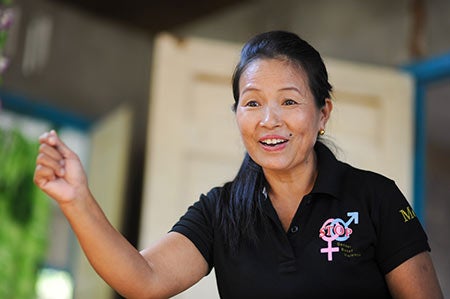Myitkyina, Kachin State - UNFPA supports the Metta Development Foundation who have established eight women and girls centres (WGCs) in Kachin. The WGCs are located in both Government Controlled Areas (GCA) and Non-Government Controlled areas (NGCA) and support women and girls from communities and Internally Displaced Person (IDP) camps in these regions. Since June 2011, due to on-going-conflict in Kachin State, more than 100,000 people have been uprooted from their homes. During times of conflict, women and girls experience increased levels of vulnerability to gender based violence (GBV) as a result of high stress levels in communities, a lack of privacy, and a breakdown in social protection mechanisms.
WGCs provide essential safe spaces for women and girls, many of whom are survivors of GBV. These are places where women and girls can access lifesaving health and legal referrals, emergency assistance and psychosocial support and counselling, without fear of judgment or shame.
In one WGC in Kachin at least 20 women and girls go to the WGC in Waing Maw Township every day, which has a total of six staff, comprising response and prevention officers and counsellors. Activities at the centre include the provision of group psychosocial activities to support survivors who are not yet comfortable in accessing individual counselling, prevention programming (such as engaging men and boys programmes) and awareness sessions on sexual and reproductive health and trafficking. The WGCs provide a safe space for women and girls who are in need of support to rebuild confidence and empower themselves.

Daw Hkawng Gan, Centre Manager said: "Most of our activities are based at the centre, where women and girls have a confidential and safe space in which to discuss issues they are facing. The women and girls who attend our centre are from IDP camps. We provide training on life skills, including teaching women and girls how to make handicrafts". This simple act of making handicrafts is a critical group psychosocial activity in which women and girls can engage to foster a sense of community between the women. These activities can also contribute to the economic empowerment of women which in turn increases self-esteem.
Many GBV survivors do not talk openly about their experiences, especially women and girls who have been sexually assaulted and raped. Daw Hkawng Gan said: "It is important for women and girls to understand that they are not alone in surviving GBV and that at the WGC they can share their experiences with others in a safe space, knowing that anything they say is confidential". A WGC provides this space as well as the services to make sure that specialist health, mental health and legal support are available.




